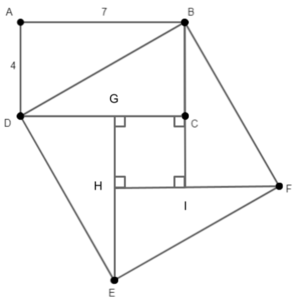Difference between revisions of "2021 JMPSC Invitationals Problems/Problem 12"
(Created page with "==Problem== Rectangle <math>ABCD</math> is drawn such that <math>AB=7</math> and <math>BC=4</math>. <math>BDEF</math> is a square that contains vertex <math>C</math> in its in...") |
(→Solution 3 (Mass points and Ptolemy)) |
||
| (6 intermediate revisions by 2 users not shown) | |||
| Line 2: | Line 2: | ||
Rectangle <math>ABCD</math> is drawn such that <math>AB=7</math> and <math>BC=4</math>. <math>BDEF</math> is a square that contains vertex <math>C</math> in its interior. Find <math>CE^2+CF^2</math>. | Rectangle <math>ABCD</math> is drawn such that <math>AB=7</math> and <math>BC=4</math>. <math>BDEF</math> is a square that contains vertex <math>C</math> in its interior. Find <math>CE^2+CF^2</math>. | ||
| − | ==Solution== | + | ==Solution 1 (Clever Construction)== |
| − | + | <center> | |
| + | [[File:Invites12.png|300px]] | ||
| + | </center> | ||
| + | |||
| + | We draw a line from <math>E</math> to point <math>G</math> on <math>DC</math> such that <math>EG \perp CD</math>. We then draw a line from <math>F</math> to point <math>H</math> on <math>EG</math> such that <math>FH \perp EG</math>. Finally, we extend <math>BC</math> to point <math>I</math> on <math>FH</math> such that <math>CI \perp FH</math>. | ||
| + | |||
| + | Next, if we mark <math>\angle CBD</math> as <math>x</math>, we know that <math>\angle BDC = 90-x</math>, and <math>\angle EDG = x</math>. We repeat this, finding <math>\angle CBD = \angle EDG = \angle FEH = \angle BFI = x</math>, so by AAS congruence, <math>\triangle BDC \cong \triangle DEG \cong \triangle EFH \cong \triangle FBI</math>. This means <math>BC = DG = EH = FI = AD = 4</math>, and <math>DC = EG = FH = BI = AB = 7</math>, so <math>CG = GH = HI = IC = 7-4 = 3</math>. We see <math>CF^2 = CI^2 + IF^2 = 3^2 + 4^2 = 9 + 16 = 25</math>, while <math>CE^2 = CG^2 + GE^2 = 3^2 + 7^2 = 9 + 49 = 58</math>. Thus, <math>CF^2 + CE^2 = 25 + 58 = \boxed{83}.</math> ~Bradygho | ||
| + | |||
| + | ==Solution 2 (Trig)== | ||
| + | Let <math>\angle DBC = \theta</math>. We have <math>\cos(90- \theta)=\sin(\theta)=\frac{7 \sqrt{65}}{65}</math>, and <math>\cos(\angle CDE)=\frac{4 \sqrt{65}}{65}</math>. Now, Law Of cosines on <math>\triangle DCE</math> and <math>\triangle BCF</math> gets <math>CF^2=25</math> and <math>CE^2=58</math>, so <math>CE^2+CF^2=\boxed{83}.</math> ~ Geometry285 | ||
| + | |||
| + | ==Solution 3 (Mass points and Ptolemy)== | ||
| + | Let <math>O</math> be the center of square <math>BDEF</math>. Applying moment of inertia to the system of mass points <math>\Sigma = {1B,1D,1E,1F}</math> (which has center of mass <math>O</math>) gives <cmath>CB^2 + CD^2 + CE^2 + CF^2 = OB^2 + OD^2 + OE^2 + OF^2 + 4OC^2.</cmath> Since <math>\triangle CBD</math> is a right triangle, we may further cancel out some terms via Pythag to get <cmath>CE^2 + CF^2 = OE^2 + OF^2 + 4OC^2 = 65 + 4OC^2.</cmath> To compute <math>OC</math>, apply Ptolemy to cyclic quadrilateral <math>DOCB</math> (using the fact that <math>\triangle BOD</math> is 45-45-90) to get <math>OC = \tfrac{3}{\sqrt 2}</math>. Thus <cmath>CE^2 + CF^2 = 65 + 4\cdot\frac 92 = 65 + 18 = \boxed{83}.</cmath> ~djmathman | ||
| + | |||
| + | ==See also== | ||
| + | #[[2021 JMPSC Invitationals Problems|Other 2021 JMPSC Invitationals Problems]] | ||
| + | #[[2021 JMPSC Invitationals Answer Key|2021 JMPSC Invitationals Answer Key]] | ||
| + | #[[JMPSC Problems and Solutions|All JMPSC Problems and Solutions]] | ||
| + | {{JMPSC Notice}} | ||
Latest revision as of 20:45, 22 December 2021
Contents
Problem
Rectangle ![]() is drawn such that
is drawn such that ![]() and
and ![]() .
. ![]() is a square that contains vertex
is a square that contains vertex ![]() in its interior. Find
in its interior. Find ![]() .
.
Solution 1 (Clever Construction)
We draw a line from ![]() to point
to point ![]() on
on ![]() such that
such that ![]() . We then draw a line from
. We then draw a line from ![]() to point
to point ![]() on
on ![]() such that
such that ![]() . Finally, we extend
. Finally, we extend ![]() to point
to point ![]() on
on ![]() such that
such that ![]() .
.
Next, if we mark ![]() as
as ![]() , we know that
, we know that ![]() , and
, and ![]() . We repeat this, finding
. We repeat this, finding ![]() , so by AAS congruence,
, so by AAS congruence, ![]() . This means
. This means ![]() , and
, and ![]() , so
, so ![]() . We see
. We see ![]() , while
, while ![]() . Thus,
. Thus, ![]() ~Bradygho
~Bradygho
Solution 2 (Trig)
Let ![]() . We have
. We have ![]() , and
, and ![]() . Now, Law Of cosines on
. Now, Law Of cosines on ![]() and
and ![]() gets
gets ![]() and
and ![]() , so
, so ![]() ~ Geometry285
~ Geometry285
Solution 3 (Mass points and Ptolemy)
Let ![]() be the center of square
be the center of square ![]() . Applying moment of inertia to the system of mass points
. Applying moment of inertia to the system of mass points ![]() (which has center of mass
(which has center of mass ![]() ) gives
) gives ![]() Since
Since ![]() is a right triangle, we may further cancel out some terms via Pythag to get
is a right triangle, we may further cancel out some terms via Pythag to get ![]() To compute
To compute ![]() , apply Ptolemy to cyclic quadrilateral
, apply Ptolemy to cyclic quadrilateral ![]() (using the fact that
(using the fact that ![]() is 45-45-90) to get
is 45-45-90) to get ![]() . Thus
. Thus ![]() ~djmathman
~djmathman
See also
- Other 2021 JMPSC Invitationals Problems
- 2021 JMPSC Invitationals Answer Key
- All JMPSC Problems and Solutions
The problems on this page are copyrighted by the Junior Mathematicians' Problem Solving Competition. 










